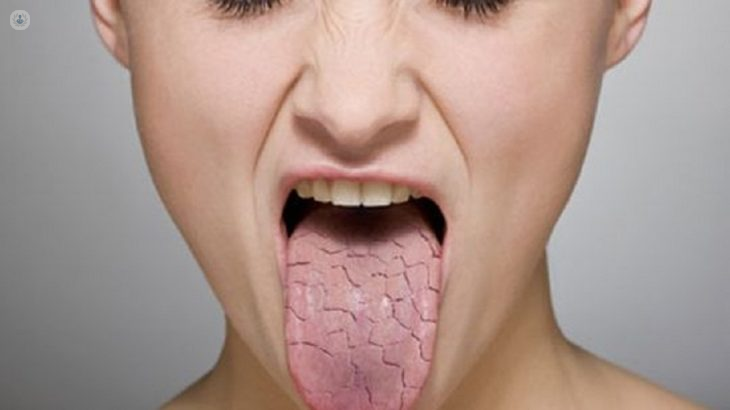


What is Sjögren’s syndrome?
Sjögren’s syndrome is a disease that affects moisture-producing glands of the body. Specifically, it is an autoimmune disorder (meaning the immune system attacks the cells of its own body) in which the tear- and saliva-producing glands are destroyed, leading to dry mouth and eyes. The syndrome can also affect other parts of the body, including the joints, blood vessels, digestive organs, nerves, kidneys and lungs. Very often, it dries out other parts of the body that need to remain moist, such as the nose, the skin and the throat. It is classified as a rheumatic disease affecting joints, tendons, ligaments, bones and muscles. The syndrome generally affects people aged over 40 years. Sometimes, it is linked to diseases such as rheumatoid arthritis and lupus.
Prognosis
Dental and ophthalmic damage can be prevented and symptoms can also be treated. Serious problems affecting internal organs are rare; if they do occur, the physician can change the treatment to control inflammation and prevent damage. Patients with Sjögren’s syndrome have a higher probability of developing cancer of the lymph glands; nevertheless, if detected in time, this cancer can be treated effectively.
Symptoms
Sjögren’s syndrome can cause many different symptoms. The main symptom is dry eyes; the patient may feel a burning, stinging or gritty sensation in their eyes. Other possible symptoms are blurred vision or sensitivity to intense light, specifically fluorescent light. Dry mouth; the patient may feel like they have chalk in their mouth or that it is full of cotton. The patient may also experience difficulties swallowing, talking or distinguishing the flavour of foods.
The syndrome may also affect other parts of the body such as: the skin; joints; lungs; kidneys; blood vessels; organs of the digestive system; nerves. Some of the possible symptoms are: dry skin; rash; chronic dry cough; thyroid problems; muscle and joint pain; vaginal dryness; numbness and tingling sensation in the arms and legs; fatigue.
Medical tests
The specialist will begin with a full physical examination to detect dry eyes and mouth, and possible presence of mouth ulcers, deterioration of teeth and inflammation of gums, due to dry mouth. The specialist will also examine your mouth looking for a possible fungal infection. Similarly, the specialist will look out for an allergic reaction on the skin; the pulmonary examination may present abnormal results; abdominal palpation may be performed to detect possible liver enlargement. Joints may be examined to detect possible arthritis and examination of the nerves may reveal abnormalities.
Here are some of the tests that the specialist may perform:
- Full blood chemistry with liver enzymes
- Complete blood count
- Urinalysis
- Examination of antinuclear antibodies (ANAs)
- Rheumatoid factor
- Cryoglobulin test
- Complement levels
- Protein electrophoresis
- Hepatitis C test
- Thyroid function tests
- Schirmer test to evaluate tear production
- Biopsy of salivary glands
- Skin biopsy if a skin allergy is present
- Examination of the eyes
- Chest X-ray
What are the causes of Sjögren’s syndrome?
Currently, the cause of Sjögren’s syndrome is unknown. As previously mentioned, it is an autoimmune disorder in which the body attacks itself. The disease is rare in children and occurs most commonly in women aged 40 to 50 years. The primary form is defined as dryness of the eyes and mouth without any other autoimmune disorder. The secondary form is the form that occurs in association with another autoimmune disorder, specifically:
- Rheumatoid arthritis (RA)
- Systemic lupus erythematosus
- Scleroderma
- Polymyositis
- Hepatitis C may affect the salivary glands and resemble Sjögren’s syndrome
Treatments
The primary aim of treatment is to relieve symptoms. Eye dryness can be treated with artificial tears, eye creams or liquid ciclosporin. If a Candida infection occurs, it can be treated with sugar-free nystatin or miconazole. In addition, tiny plugs may be placed in the tear drainage ducts so that tears remain in the eye longer.
Other measures you may take to relieve symptoms are:
- Take sips of water throughout the day
- Instead of regular chewing gum, make sure you chew sugar free versions
- Avoid medications that may cause mouth dryness, such as antihistamines or decongestants
- Avoid alcohol
- Mouthwashes to replenish mineral salts in the teeth
- Saliva substitutes
- Drugs that help the salivary glands produce more saliva
- Brush your teeth and use dental floss frequently, to prevent tooth decay due to dry mouth
- Visit your dentist regularly for check-ups and cleaning
Which specialist treats it?
The rheumatologist is the specialist that diagnoses and treats musculoskeletal diseases and systemic autoimmune diseases. Rheumatologists treat a wide range of complex diseases affecting the locomotor apparatus and also possibly affecting other organs and tissues such as the skin, eyes, and nervous system.
